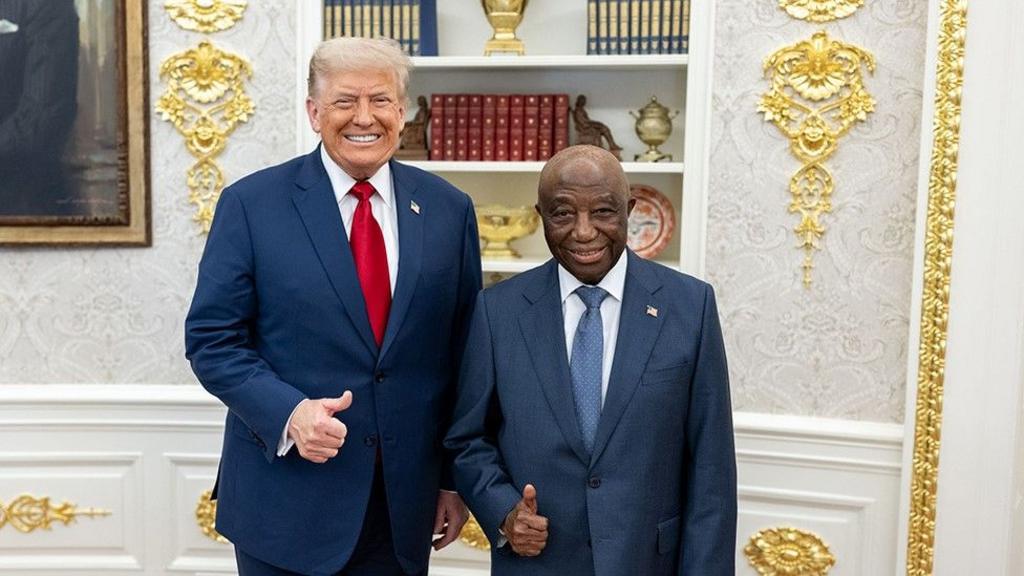US President Donald Trump recently commended Liberia’s President Joseph Boakai for his “good English,” inquiring about his schooling.
However, this remark overlooks the unique and enduring connection between Liberia and the United States.
English is Liberia’s official language, and many Liberians speak with an American accent due to these historical ties.
It’s plausible that President Trump was responding to this familiar accent.
Here are five key facts to understand about this West African nation:
Liberia was founded in 1822 by freed African-American slaves and declared its independence in 1847.
Thousands of Black Americans and liberated Africans—rescued from transatlantic slave ships—settled in Liberia during the colonial era.
Former US President Abraham Lincoln formally recognized Liberia’s independence in 1862. Despite this, Liberia retained significant US heritage and remained within the American “sphere of influence” during the colonial period.
As a result of this integration, Liberian culture, landmarks, and institutions exhibit a strong African-American influence.
Ten of Liberia’s 26 presidents were born in the United States.
The descendants of these freed slaves, known as Americo-Liberians, held a dominant position in the country for over a century.
This dominance fostered resentment among some indigenous Liberians, leading to the overthrow and assassination of William Tolbert, the last president from that community, in a 1980 coup.
Americo-Liberians account for approximately a quarter of the population, according to Britannica, which notes that more than two dozen languages are spoken in the country.
President Boakai, a member of the Kissi ethnic group, likely spoke Kissi as his first language before learning English in school.
Liberia’s capital, Monrovia, is named in honor of America’s fifth President, James Monroe, a strong proponent of the American Colonization Society (ACS).
The ACS played a pivotal role in resettling freed African-Americans in West Africa, ultimately leading to Liberia’s establishment.
Unsurprisingly, the city’s early architecture was significantly influenced by American-style buildings.
Many streets in Monrovia bear the names of colonial American figures, reflecting the city’s founding and its historical ties to the United States.
The city’s primary hospital is named the John F. Kennedy Medical Center (JFKMC) after the former US president.
The Liberian flag closely resembles the American flag, featuring 11 alternating red and white stripes and a blue square with a single white star.
The white star symbolizes Liberia as the first independent republic in Africa.
In comparison, the US flag has 13 stripes representing the original 13 colonies and 50 stars, each representing a state.
The Liberian flag was designed by seven Black women, all of whom were born in America.
Timothy Weah, son of Liberia’s former President George Weah, is an American professional soccer player for Italian club Juventus and the US national team.
The 25-year-old forward, born in the US, began his professional career with Paris St-Germain in France, winning the Ligue 1 title before joining Scottish team Celtic on loan.
His father, George, a Liberian football legend, won the Ballon d’Or in 1995 while playing for Juventus’s Italian rivals, AC Milan. He remains the only African to have won this prestigious award and was elected president of Liberia in 2018.
Liberia produced Africa’s first elected female president, Ellen Johnson Sirleaf.
Elected in 2005, two years after the end of the nation’s civil war, she served as president until 2018.
Johnson Sirleaf has strong ties to the United States, having studied at Madison Business College and Harvard University, where she earned a degree in economics.
She has received global recognition and accolades for maintaining peace during her administration.
Her career is marked by acts of defiance and courage.
In 2011, along with Leymah Gbowee and Tawakkul Karmān, she was awarded the Nobel Peace Prize for her contributions to advancing women’s rights.
In 2016, Forbes listed her among the world’s most powerful women.
Foreign Minister Sara Beysolow Nyanti dismissed the incident as awkward, citing a “lack of understanding” globally about the languages spoken in Africa, which she described as a “multi-lingual continent.”
“Liberia happens to have the American-English intonation, and I believe President Trump heard something familiar in the way President Boakai spoke, which is different from how others speak on the continent,” she told the BBC’s Newsday program.
“We were not offended at all,” she stated, adding that beyond the cameras, there was discussion of the two countries’ shared history.
However, reactions among other Liberians were mixed.
Accountant Joseph Manley, 40, told the BBC that Trump should have been properly briefed before meeting Liberia’s leader.
“Liberia has always been an English-speaking country. Our president represents a country with a rich educational tradition.”
Henrietta Peter-Mogballah, a human resources professional, believes the US president’s surprise at Boakai’s eloquence reflects a broader issue of global ignorance regarding African nations and their people.
“From travel experiences and observations, most citizens of other nations outside Africa do not know a lot about African countries,” she said. “The few that know a little, their minds are clouded by narratives of war, poverty, and lack of education.”
Lawyer and politician Kanio Gbala, however, agreed with the foreign minister that no insult was intended.
“I believe President Trump’s remark was a genuine compliment on President Boakai’s command of English,” he told the BBC. “There is no evidence of sarcasm. Reading it as disrespectful may reflect political agendas.”
Go to BBCAfrica.com for more news from the African continent.
Follow us on Twitter @BBCAfrica, on Facebook at BBC Africa or on Instagram at bbcafrica
The United States announces sweeping changes to its non-immigrant visa policy for Cameroon, Ethiopia and Nigeria.
South Africa has been at the forefront of the successful battle to halt the spread of HIV/Aids – until now.
Government will not stand by and watch businesses and lives destroyed by sponsored rioters, Ruto says.
Rached Ghannouchi was sentenced as part of a sweeping case involving several high-profile politicians.
Lesotho faces tariffs of 50% – higher than any other country because of its large trade surplus with the US.

